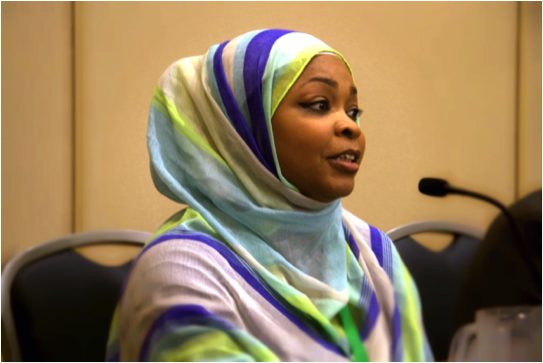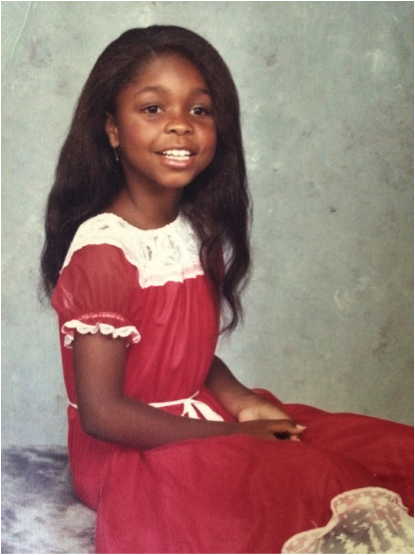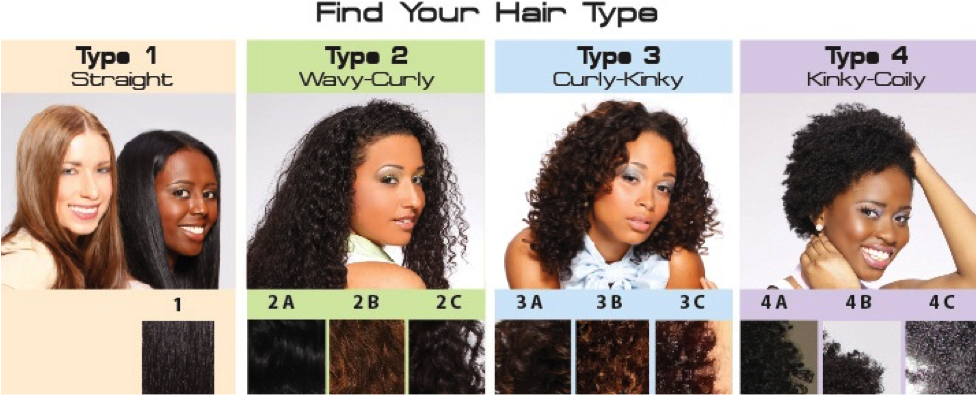For Mother’s Day last year, my husband surprised me with a spa treatment at a Muslim-owned beauty salon. Long overdue for self-care, I gladly accepted the gift of the works done under the care of an Afro Brazilian Muslim woman. When we arrived at the shop, my daughter ran into her arms and gave her the biggest hug. “She looks so much like my grandchild,” the woman said, and I felt like I was in good hands. The Moroccan shop owner escorted me to the private room in the back and suggested treatments. I asked for a manicure, a pedicure, and some red highlights. I hoped that they would match the auburn undertones of my childhood, when I used to spend hours swimming and basking in the sun.
Eight-year-old me, unprocessed hair
The owner of the shop decided to split the work of my highlights, manicure, pedicure, and hair styling to other salon workers. My highlights were tasked to a Syrian woman. I smelt the chemicals and had no mirror to know what was going on. It didn’t take long before I could sense her frustration. Unlike the Brazilian sister, she didn’t understand Black hair. They knew I spoke Arabic, so the Syrian stylist would escape the room to talk to the owner. I became embarrassed and apologetic about the length and thickness of my hair. Ever since I was little, Black stylists in the past would complain, “Girl you have so much hair.” They’d charge me double the regular prices.
With sections of bleached hair covered in foil, my anxiety rose each moment as I waited for the color to lift. What if the bleached sections fall out? How many years would it take to grow my hair back? I felt so helpless. But once the Afro Brazilian sister returned to fix the situation, I felt more at ease. She twisted my hair into ringlets and gave me tips on how to care for my hair. When my daughter saw me hours later, she threw the biggest tantrum because she wanted hair styled in ringlets, too.
The Kinks in the System
Hair typing Courtesy of askeaboutmyair.com
The ideal of silky straight hair has social, economic, and even romantic implications for Black women. Some men will insist on their partners wearing their hair straightened. Even without coercion, social pressure plays a part in many women’s choice to wear their hair straight. Black women have lost jobs for wearing their natural hair to work. Before I wore hijab, my mother told me I look more professional and polished when I straightened my hair. My family bemoaned the change my hair went through when I hit puberty, from silky and straight to wooly and wavy.
Growing up, I knew that hair textures that are closer to European were considered “good hair” while tightly coiled hair was looked down upon and called nappy. These ideals exist all over the African Diaspora. Pelo Malo (2013), which means “bad hair” in Spanish, is a Venezuelan film that explores racism and homophobia. The ways in which communities in the African Diaspora ascribe value to a woman’s worth based on her hair texture is similar to colorism. One traditional scholar from a Gulf country sought to marry his East African student, but then retracted his offer when he saw her natural, kinky hair. My friend once tried to match make an African American brother who refused to consider a Black woman because of “their hair issues.” He eventually married a Yemeni woman who had silky hair that could wash and go. Someone told me about her friend, a light skinned Black woman, whose African American husband found her unattractive and divorced her because she did not have long, silky hair.
Marouane Fellani courtesy of Wikipedia
The politics of hair even extends to the Middle East and North Africa. When I lived in Kuwait and Egypt, rocking an afro was like an act of resistance. Many Arab and North African women will chemically treat and straighten their hair with heat in order to make it similar to the ideal of silky straight hair. The Egyptian stylists who did my hair cooled their marcel irons by spinning them in the air like pros. A Libyan stylist came to my apartment in Palo Alto, CA to do my hair and makeup in preparation for my wedding. We shared this desire to iron out our kinky, wooly, nappy, wavy, curly, frizzy, and tightly bound coils.
Women all over the African Diaspora feel the intense pressure to fit the European standards of beauty. They don wigs, sew or glue in tracks of hair or have long longs. Many women are in a catch 22 — they are criticized for having kinky hair, but then derided for being fake when they wear extensions and weaves. As Suhaib Webb points out, most Muslims consider wearing wigs haram, although some scholars give expiation if it’s done with the husband’s knowledge.
A woman’s self esteem can plummet if she experiences hair loss due to a health condition. Women of all races can suffer from alopecia or receding hairlines from stress, friction of their scarves, or tension due to tight ponytails. But for African American women, the stigma of hair loss is layered with stereotypes about Black women’s hair. An African-American man told me that Moroccan women like his wife have a term for Black women, nisaa bidoon sha’ar (“women without hair”). Even though most Black women have an abundance of hair, there are some African cultures where women shave their heads. And hair loss happens because curly hair is more fragile than straight hair. The harsh dyes, chemicals, and heat that many curly and kinky-haired women use often contribute to breakage, and therefore shorter hair.
I Love My Hair
To counter the emotional turmoil of trying to live up to impossible beauty standards, many are reclaiming their hair. We are teaching our children to love their hair. Whether sheering their tresses off, straightening with a blowout, locking their hair, or styling their natural curls, Black women are embracing who they are despite outside pressure to be someone else. Women like Amber Rose and Lupita N’yong have shown that a buzz cut can actually reveal a woman’s beauty. Black women wear braids, locks, afros, twists, and twist outs and relish in their unique hair textures. We refuse to comply with external standards to match others’ stereotype of what women’s hair should look like.
And that’s even when, as Muslims, our natural hair exposes us to “What do you have under your scarf?” one too many times. The question is then followed with reminders about the hadith that describes women whose “heads sway like camel humps” who will reside in hell. Several Black Muslim women have told similar stories about being told something is wrong with them because of the shape of their hijab.
My bun at ISNA 2015
My hair – like the hair of other Black Muslim women, whether we cover or not and whether it is short or long — is magical. Refusing societal definitions of beauty, we have to create spaces for ourselves to appreciate the beauty that Allah has given us.
Margari Aziza is an Associate Editor at altM.





















The struggle is real. I mean in the DC area finding private salons and or places that have private areas (NOT upfront with all the windows) is an issue. I have FINALLY (at 30) embraced my hair just the way it is. I some times straighten it but I also (the majority of the time) have my natural hair styled in braids or twists and in buns. As woman who don’t cover, I like diversity in the way I look.
Great perspective.
About the hadith of women’s hair swaying like camel’s humps, and whether that relates to hair buns:
Most buns, even large ones, do not resemble a camel’s hump. The defining feature of the camel’s hump is that it points upwards, whereas most hair buns point backwards, downwards, or sideways. Therefore, a large bun that is not gathered at the top of the head does not resemble a camel’s hump.
P.S. Dreadlocks are halal! https://qahiri.wordpress.com/2012/05/20/can-muslims-wear-dreadlocks/
Terrific writ! As an Indian with curly hair, hey presto, I enter with all the hair care/hair image with business and baggage.
Managing and learning to love and not feel insecure because of the nature of our hair is one of the issues. So many more pop up with hijab, as you said. Not to mention post hijab helmet hair. As an unmarried hijabi, it sometimes is dreadful to imagine how we’re going to manage looking appreciable around a person whos never lived with us.
Alhamdulilah for the magic and comfort of our hair though, as enticing as straight and silky is, wouldn’t want to change it.
I relate to this on personal level. As someone who is from an African background, I’ve constantly had to feel ashamed of my hair. My hair which was thicker in comparison to my sisters looser curls so of course there were some comments.When I started wearing hijab as a child it felt like a blessing because I felt like my hair was ugly and I could cover it all up without anyone knowing what my hair looked like. Recently I’ve started to appreciate my hair more and started wearing my hair naturally and have undergone a big chop. My hair is much healthier and I’m happier with myself because I’ve realised that all hair is beautiful and I’m so thankful for you writing this because I’ve never heard anyone mention this before, especially for black muslim women.
The Prophet sallAllahu ‘alaihi wa sallam would say: ‘O Allah, as You have made my appearance beautiful, likewise make my character beautiful. – (‘Allahumma kama hassanta khalaqee fa hassin khuluqee”).
To love ourselves and accept ourselves exactly as Allah created us is not only Sunnah but it is Ibadah and worship as well, because Allah loves gratitude from His servants and that they are pleased with what He has decreed for them. May Allah guide us all from the darkness and ignorance of racism back to the light of Islam and the Sunnah of His Messenger (sallah ala alaihi was salam) Amen.
Amber Rose is White not Black
amber rose is mixed
Preach sister!! I’m actually Egyptian and i live in kuwait. Like you, I had straight hair as a kid, and like you my hair changed completely later on (but due to chemical and physical damage) and my mom is always complaining about how beautiful my hair was and how I’ve ruined it AND how I’m supposed to get married someday etc etc. I used to always straighten it so needless to say, my already damaged hair went through even MORE damage. Now I’m sitting here typing this with god knows how many curls surrounding my head. Al hamdulilah i haven’t straightened it for 5+ months and am actually on a recovery journey to repair my hair. (Sadly though i can’t find any curly hair products here and when i do they’re extremely overpriced). #curly&proud
I believe Jesus is God’s son sent from heaven. I came here to figure out why in Denver, CO we have so many women wearing these black head scarves, I now know are called hijabs. I don’t feel good knowing now, what I know because that means they’re all Muslims! It just doesn’t make any sense to me that people believe in Allah. The Quran wasn’t even written until 600 years after the Bible. Look into your religion please! Don’t just follow along with what your family and their friends tell you, seek for yourself! Once you start talking to the Lord in prayer, you will see for yourself. I won’t hate Muslim woman, after reading this, but I will be praying that they see the Light.
Dear April, I converted to Islam on my own when I was 21 years old. Now I am 71 years old. I am highly educated with 2 degrees in Education. I was raised Methodist, attended church every week, read the entire bible many times, and found my true belief in Islam. What you wear does not determine what you believe but it is the other way around. I wear a head covering, but it is what I do, my deeds, that determine my place in Islam and with my Creator. BTW, Allah is an Arabic word meaning God, which is not a different God. Christians in Arab countries call God Allah. Do me a favor and READ, so you understand more for yourself. May you be guided.
Dear April,
May ALLAH(1 GOD, creator of all) have mercy on us all. If the word GOD is unrecognizable to you because it is written in a language other than English does that not make it GOD because it is in another language? You should research carefully before expressing your thoughts online. Your belief is your belief and we as Muslim women have our belief that does not make us any less “enlightened.” You should refrain from commenting on religions to which you have no clear knowledge of. Hijab is a form of modesty that brings us closer to our creator, and Islamic women are not the only religious women that cover up there head. You as a believer in Christ who profess to have read the bible should know that the bible also refers to why a woman should cover her head. Have you ever questioned why Mary mother of Jesus(PBUH) covered her head, or why nuns cover their head or why Jewish women cover their heads? Let us learn more before commenting in such a manner as you have. We are well educated and encouraged to think and learn and love mankind despite difference in beliefs. As you pray for us to see the light, a prayer is also made for you to see the light as well. May ALLAH(1 GOD/CREATOR of all) have mercy on us all.
P.S. the gospels were written forty plus years after Jesus(PBUH) departed from this earth and the bible was compiled from people who were not eyewitnesses of the life of Jesus(PBUH) and who did not walk alongside Jesus(PBUH) but HEARD about him!